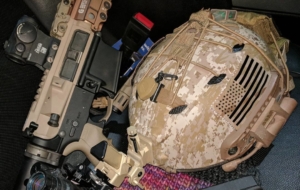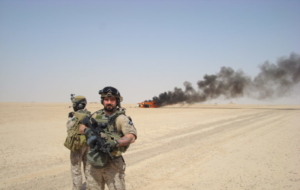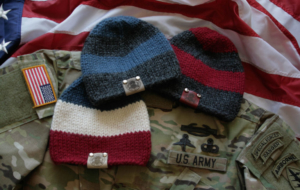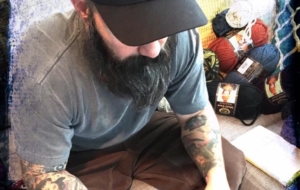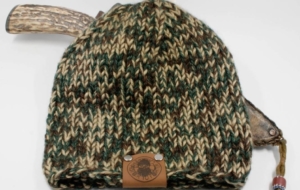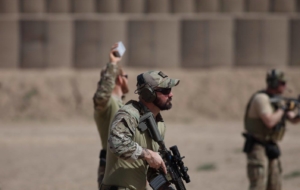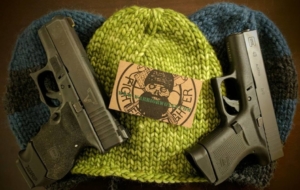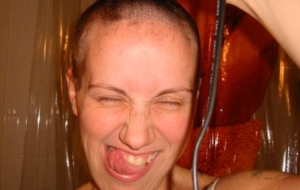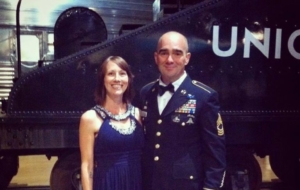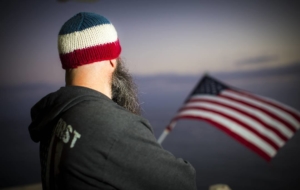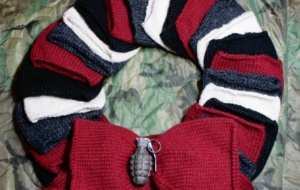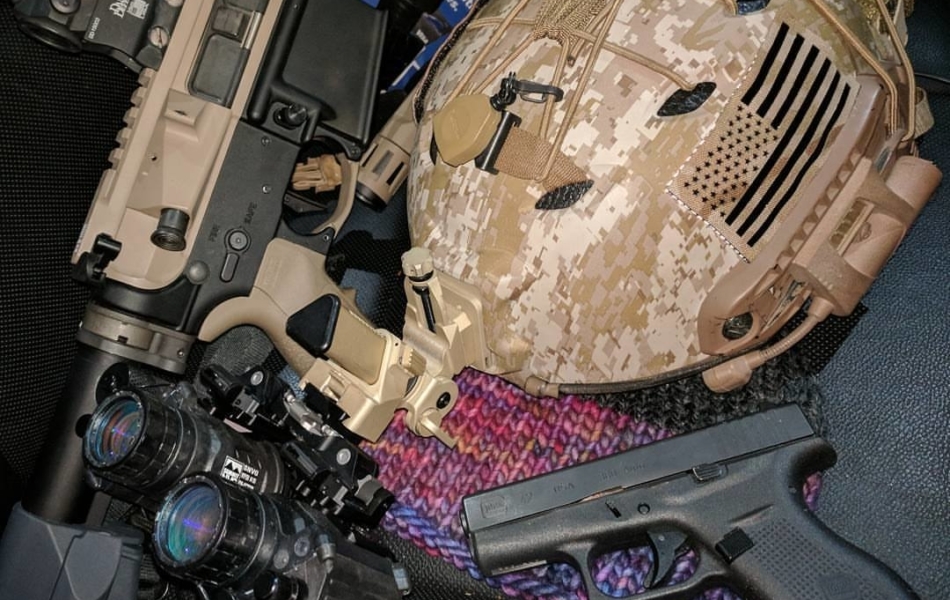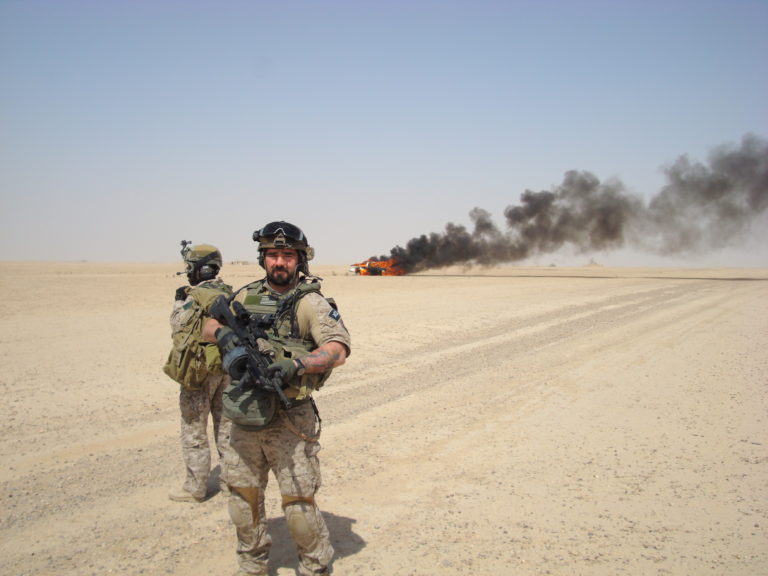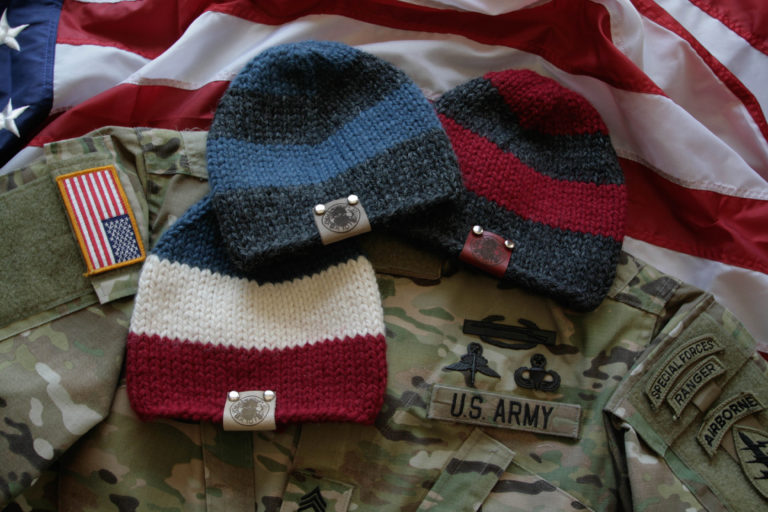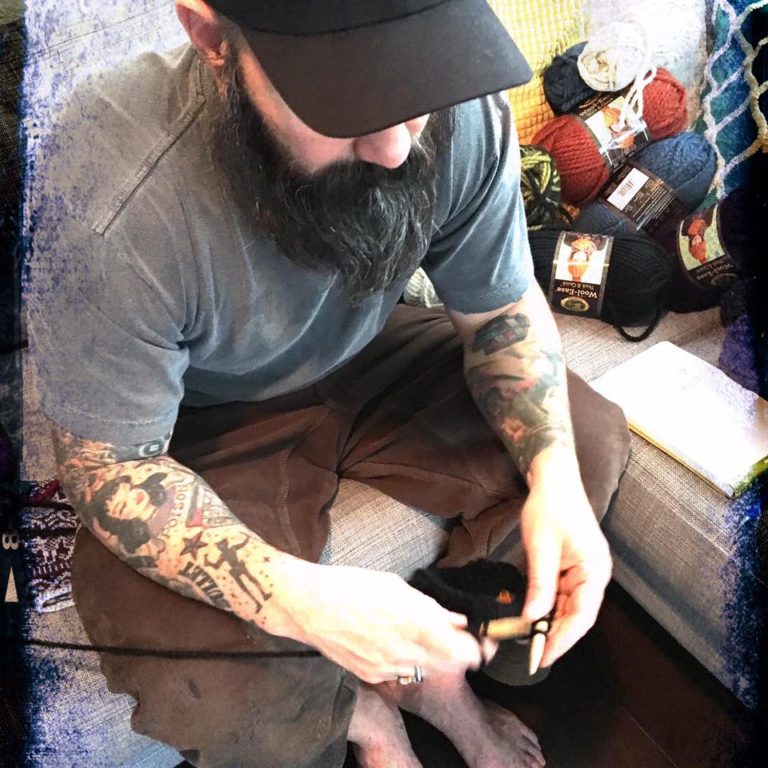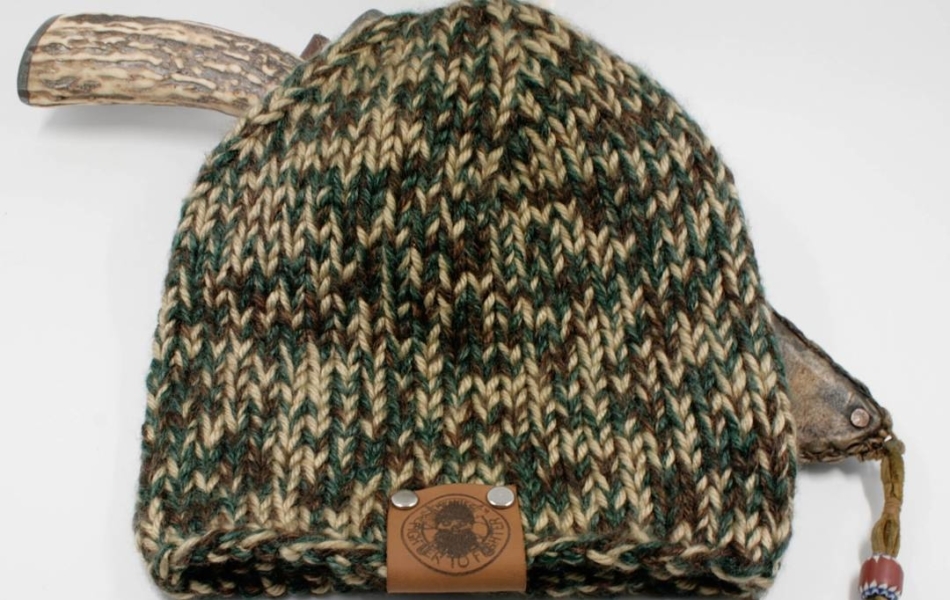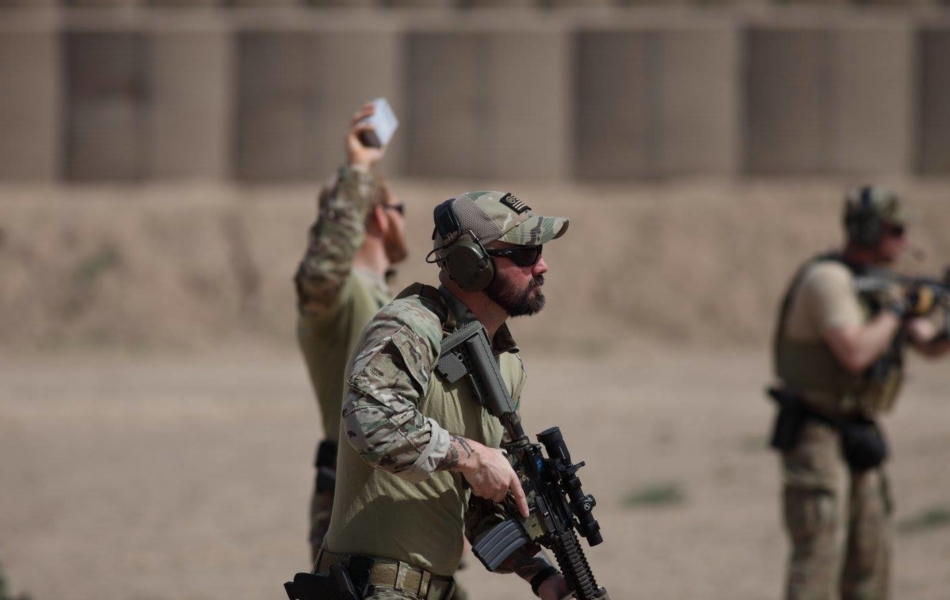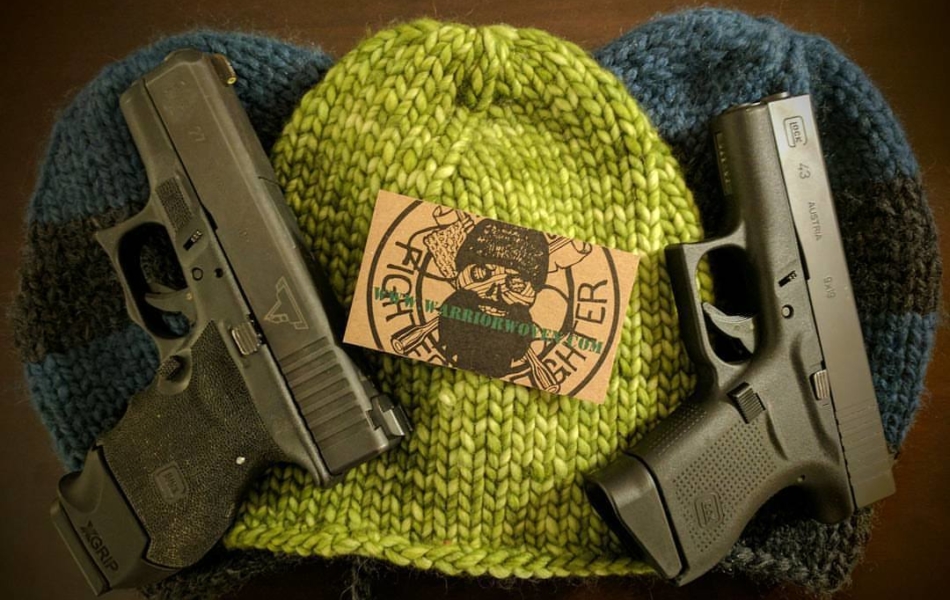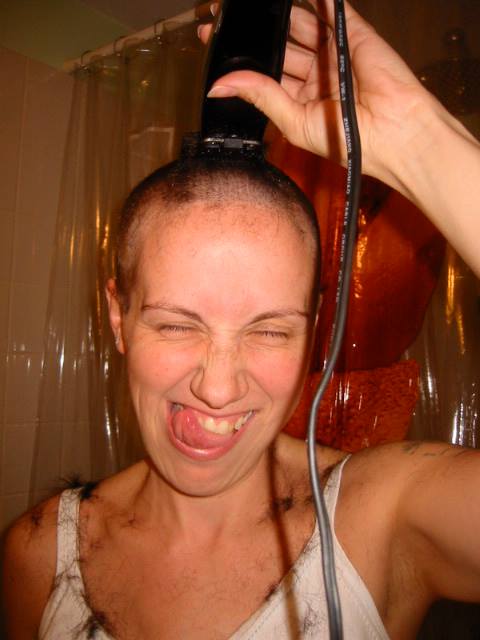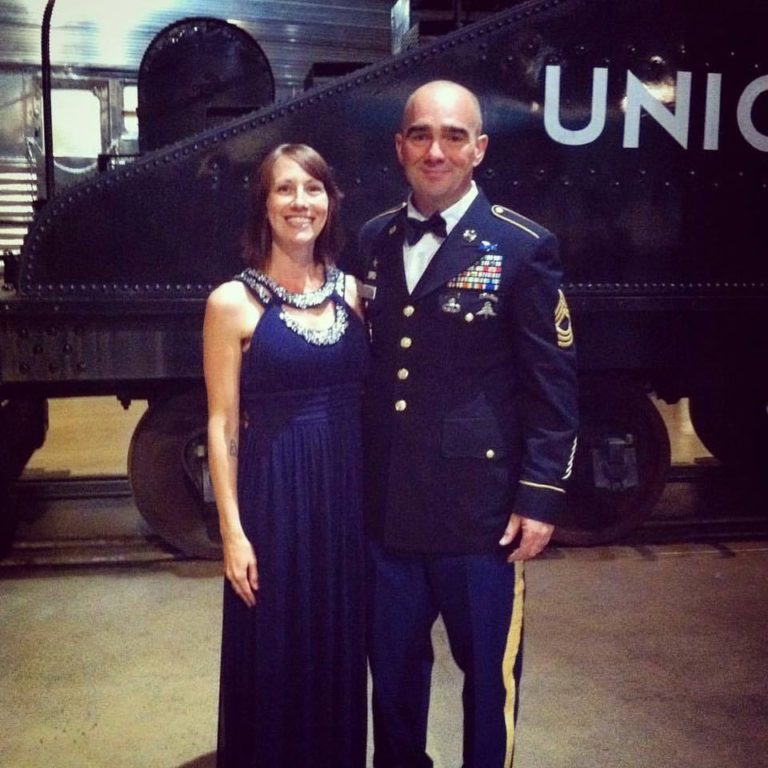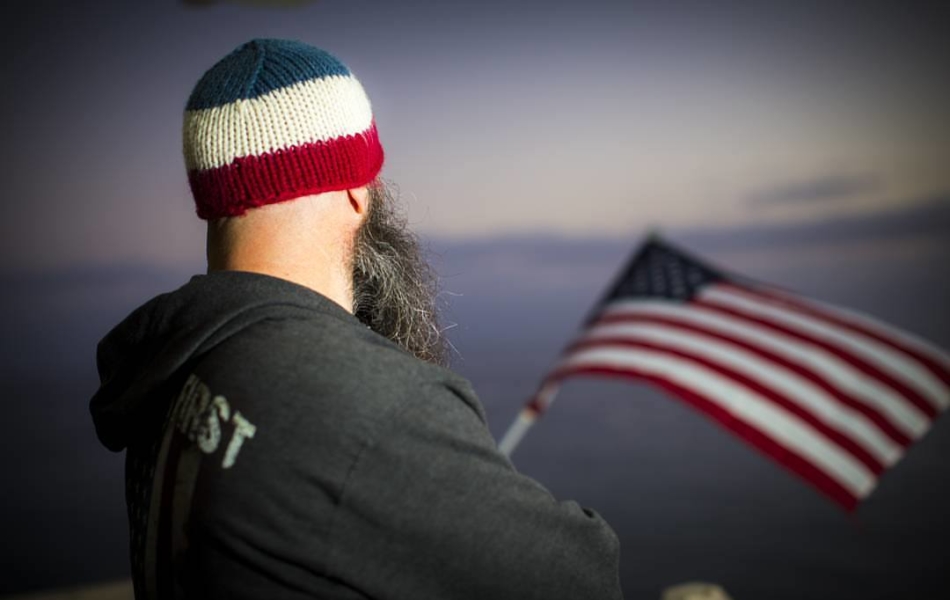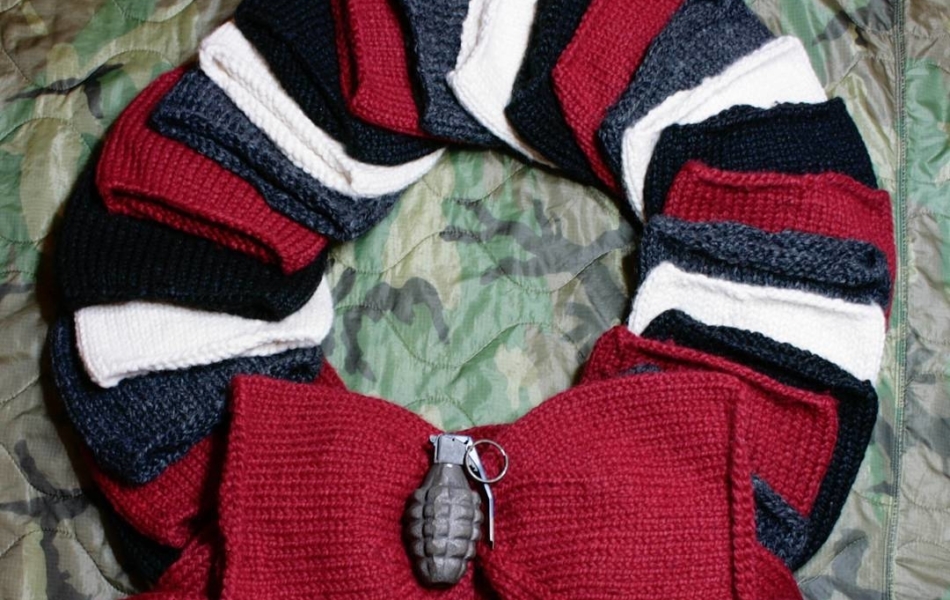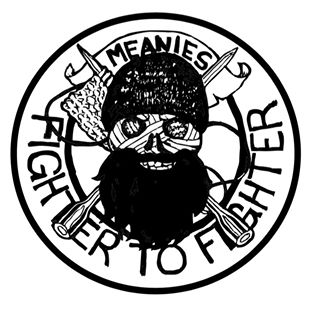
About WARRIOR WOVEN
Meanies, Warrior Woven’s flagship product, are handcrafted, ruggedly designed knitted skull caps. A Meanie is representative of the fighter in all of us. All Meanies are hand knit by Fighters: combat wounded veterans, Green Berets, Cancer fighters, soldiers, and caregivers for the combat wounded. Every stitch not only helps produce the best quality skull caps available but helps our fighters find healing.
ABOUT KEVIN TRETTER
Please describe your service to our country (years in service, rank, deployments, etc): Kevin Tretter is a combat decorated Green Beret who deployed multiple times to Afghanistan and Iraq. He entered Special Operations at a young age and says he was surrounded by monsters and giants the entire time. Every day at work was very humbling and it was incredibly exciting to be around the guys with whom he had the privilege to work. Kevin makes a point to say that his service doesn’t define him, rather, the guys around him. Though it has been almost 2 years, he admits it is still difficult to picture himself out of uniform. The part he misses most is the community.
Injuries, if any? He was in a tragic helicopter crash October 4th, 2008 in Sadr City, Iraq. Kevin, a senior member of his detachment, was infiltrating enemy territory to conduct sniper operations against the Madi Militia when the helicopter he was onboard crashed into another helicopter. Knocked unconscious and thought to be killed in action, he rose from the destroyed helicopter covered in blood and diesel fuel and immediately began to extract his fellow teammates. Refusing treatment and stubbornly attempting to continue the mission, Kevin eventually collapsed from injuries he sustained and was medically evacuated to Walter Reed Army Medical Center.
Diagnosed with a traumatic brain injury and a severely injured cervical spine, Kevin was told his career in the military was over. The doctors, however, did not know to whom they were speaking. Kevin staggered out of Walter Reed, told his wife he was going to be ok, and reported for duty the following week. A year of rehabilitation followed and many emotional challenges arose from his head injury. Assisted by the love and support of his wife and family, he continued to push forward. He would eventually recover, rise to the rank of Master Sergeant, and lead a Special Forces Detachment through 9 months of combat operations in Afghanistan.
When did you retire? July 2016. Kevin’s wife, Alicia, is now studying photography in San Francisco and Kevin has become a stay at home Dad and entrepreneur to better support his wife and family.
Please describe what the SOF brotherhood means to you: “It’s family, it’s home, it’s my life in the sense to where I would have sacrificed everything for any one of them…” Kevin reflects that the further he gets away from it, the more he realizes how incredible those men were. One of the biggest reasons is the initial filter they must pass – those checks and balances they go through to make sure they are the right profile to do what they need to do, which is something you can’t fake.
As a leader, Kevin placed importance on bringing the team together before, during, and after deployment. He feels you could stack and rack the dudes on the team and they are pretty similar. Not only were the guys alike, but the wives were alike and the kids were alike so it was pretty amazing to have that type of mindset being shared by that large a group of people even though they are in themselves a statistical anomaly.
Living in such a densely populated state as California can be terrifying at times and the majority of what they are surrounded with is pretty filthy. He lost faith and hope in humanity because of what he was exposed to and saw downrange. However, he never thought that upon coming home, he would see the same thing here. He says law enforcement sees the worst of it every day. As a parent, it definitely concerns him. He is not big on crowds and yet he finds himself in the middle of a place where he doesn’t want to be surrounded by people with whom he does not wish to affiliate or want to associate. The only reason they continue to live where they do is to further his wife’s photography education.
After he retired from the military, Kevin got a job right away. He says it was a great position as far as salary and title but he went to work one day and just left because he saw better working conditions in third world countries than what he saw there in his own community. He was put in a position where he had to make choices that were not for the betterment of the people, but for the company and he honestly didn’t have the stomach for it.
This drove him to become a small business owner because it gave him the ability to affect change. His business model is sweat equity. At end of the day, he is part of the production team and he pays knitters the same rate he pays himself because he knows what it takes to put food on the table, keep the lights on, and provide for a family. Knitting is a creative outlet that healed his broken family. He hadn’t spoken to his mom, dad, brother or sister for almost a decade because of the personality that came from his trips downrange. They were frightened of his presence because it was hard for him to flip off the switch. This came from his brain injury and other challenges stemming from what they did downrange that affected him a little differently. This wasn’t very well received by the people around him. By levering knitting, they were able to have dialogue that wasn’t about the past or work. Instead, it revolved around problem solving and getting through the task at hand. Though that, he was able to openly collaborate and talk with his mom. They wouldn’t avoid subjects, but push past them.
Kevin would like to provide that opportunity for other veterans who may be stuck in a similar place. Though knitting, he desires to offer a creative outlet while at the same time establishing a marketplace where he can reward performance. If he stuck with a traditional business model, he simply could not do that. He would have had to sell hats bought cheaply off Alibaba and mark them up. There would be no heart or soul. Kevin states that Warrior Woven won’t be that – ever. He started the company with $5.80 and outside of social media, has done no marketing. Success to him is not “his” success but “our” success and this is only the beginning.
How has the transition from warfighter to civilian gone? Kevin flatly states, “It was horrible. On no level was I prepared for how quickly and how hard the door would slam behind me.” He feels part of this is due to the fact that in Special Forces, he was surrounded by incredible individuals who were not driven by financial gains but by competition with and for each other. Every day was bigger than the last. He doesn’t know if it was a combination of being in his 40’s and retiring with such a drastic change of life, but he feels as if he went through several breakdowns. He was to the point where he was going to sail around the world. Laughingly, he says that it is part of his personality – trying something isn’t enough. If he’s going to do something, he’s going to do it all the way. His wife, Alicia, talked him down off that ledge because the last time he sailed was 25 years ago.
Faced with a multitude of challenges that typically consume a transitioning soldier, Kevin began to search for a new purpose and direction. Unwilling to stop, Kevin decided to teach himself how to knit. It was exactly what he needed. An unconventional soldier in search of an outlet to calm the internal dialogue and emotional baggage that only a gunfighter can understand; he discovered his new passion. Attention to detail, speed, accuracy… for Kevin, it’s no different than another day at the range.
This warfighter could not have found his path forward without his wife. A fighter as well, Alicia was diagnosed with Breast Cancer 6 months after giving birth to their first child in 2005. Unwilling to accept the thought of not being alive for her son, she tucked her chin, grit her teeth, and accepted the challenge head on. The most aggressive treatment protocol one could assume was made to look easy by her poise and elegance. A Bilateral radical Mastectomy could not slow her down as she relentlessly endured dose dense chemotherapy followed by 6 weeks of radiation. She would sneak out of bed and do laundry and dishes as Kevin was caring for their family. An amazing woman, the epitome of a Mother – Alicia is a warrior. She would bring four more children into this world, never looking back, never accepting defeat.
When he started knitting, Kevin’s plan was simply to create a hat for himself. In between surgeries, he was stuck in a rut. It was a very challenging time in his life and knitting pulled him out of that hole. After that, he wanted to knit 100 hats for Camp Kesem, an all-expenses-paid summer camp that his children have gone to for over 10 years. It is humbling for Kevin to have his children experience the camp each summer because he has a large family and knows he can’t provide that for them, but it is given to them. He felt he could never give back what they have given but he could knit 100 hats and donate the proceeds to the camp, intentionally providing something tangible in that relationship.
Kevin says if he could give Meanies away, he would, but obviously he has to keep the lights on. He is proud to know the Meanies he creates will stay in families for generations. For example, with the “Those in Blue” Meanies, a police officer will retire one day, his kids will be fighting over that hat, and it will be passed down and shared. That thought gives him goosebumps. Kevin truly believes what he creates is a gift that is going to last forever.
Kevin is currently working on a concept that includes biking across the country. The plan is to build a network of local fiber farms, yarn shops, and microbreweries. He would bike and visit these places during the day, then stop at a different microbrewery for a pint each night, sharing his story while building connections coast to coast. This is how he wants to spend the money of the company – philanthropically – building a corridor across America, meeting and helping people. He wasn’t a Navy Seal, so he figures this may be safer than sailing around the world.
What is the name of the business you started? Warrior Woven
When did you start it? Kevin started creating Meanies a year ago and the company started May 2017.
Why did you start this company? Kevin was upset that he had to pay $800 up front just to start an LLC. Initially, he looked at starting a nonprofit. However, he found he would have to register in every state to sell Meanies, costing $75,000 up front. From the helicopter crash, he had been banged up a couple times and put into Walter Reed. Wounded Warrior gave his family a hoodie, that was what their big corporate nonprofit did for his family. Kevin is at the point in his life where he is disgusted by corporate nonprofits riding the coattails and pushing the pity story of veterans. Instead, Warrior Woven is providing an opportunity for productivity for veterans. There is no quota, no 4 walls, no confinement – it can be whatever it needs to be for the individual who knits with them. He knows firsthand it can definitely be therapy. He knit 700 Meanies in 1 year, which he acknowledges is a Rainman level of OCD. For this reason, Kevin doesn’t question those that knit with him but instead assumes the ones knitting at that same level are doing it for a purpose other than money.
Kevin also leveraged his previous position at UC Davis. It is a top 10 public university and he describes the ROTC kids in the program there as “brilliant.” He clung on to one guy, James Whitaker, who Kevin says should have been top cadet in the nation but was not, sadly due to paperwork failure. James went on to UVA law school and currently serves as active duty JAG. James is a huge asset for the macro side of Warrior Woven in terms of growth and direction. While Kevin calls himself the “good idea fairy,” James keeps him grounded, provides support, and also participates as one of their production knitters. Kevin describes it as a paternal relationship and he is very proud of who James is and what he is becoming. It truly is a fight club concept where everyone knits and he feels fortunate to work with the personalities surrounding him.
Kevin doesn’t like the “trespassers among us,” those who claim PTSD but simply served on the Bagram basketball team. In the same way, he doesn’t know anyone like him who is homeless. Kevin doesn’t appreciate the companies out there pulling on heartstrings to push product and make a profit instead of affecting change. With Warrior Woven, Kevin set out with a very strong stance to demonstrate what right looks like. He does this decidedly in the American way. He says we are a capitalist country and he will take advantage of that to provide a great life for his family while giving others the opportunity to do the same. Kevin states that veterans don’t need pity or handouts. He feels it is great to work with the small organizations that are truly advocates for veterans, but the big ones are just taking from the community.
Please describe your products/services: Meanies are hats hand knit by veterans. Kevin states he will never compromise on this. The production team includes veterans’ wives and he loves knowing that providing spouses with jobs puts more food on the table while providing a productive way to pass the time while their husband is out at sea. He also feels strongly about including spouses because he could not have done what he did without his wife, declaring that husbands are only as good as their wives. So he extends the invitation to veterans and their production team, which includes family.
Knitting either hits for people or it doesn’t, but when it happens, it can be a really incredible experience. For instance, knitting with his mother brought their family back together. She created the label you see for the Meanies. His sister is also working on projects and his brother has created artwork. Kevin’s brother is a toy designer for Spinmaster Studios and worked on the Star Wars figures. Now, the two of them are collaborating on future projects for Warrior Woven.
Kevin defines himself not as a Green Beret or Army guy, but as a dad. He has always prided himself in being a father. He never wants to limit his children’s creativity. For instance, he wants to write children’s books and build up ancillary product lines, all the while maintaining the purity of the Meanies. His goal is to run the company in such a way that almost all of the profit goes to the operator to show appreciation for human effort. The people knitting deserve this opportunity, not because they were veterans, but because of the path they walked and the life they lived.
Meanies will remain the centerpiece of Warrior Woven, but they also offer tactical patches, stickers, shirts, and Skullies. Skullies represent the militant side of Kevin and how he will compete on a larger scale. He explains that his last deployment was rough. They lost 15-20 guys as a whole. During a vehicle rollover on his team, one of his main 18 Charlie’s hit his neck so hard that his brain registered it as a stroke and left his left side paralyzed. Luke’s wife was pregnant with their first child when it happened. Kevin describes Luke as a beast and while he is making his way back, it has been a series of uphill battles.
Kevin wanted Luke to knit but he can’t, so using looms to create Skullies provides opportunity for those with limited mobility and function. They are still a part of his family and he wants to create opportunities for his guys. Skullies are handmade one of a time and this is not a handout or pity party. Luke is still a very capable person, he simply has limitations. Kevin says, “None of us signed up for anything other than the job we did.” Luke deserves respect. Everyone who has been banged up to the point where they left something behind deserves the opportunity for self-respect and dignity through what they create for themselves. That is the platform Kevin wants Warrior Woven to represent from his past service.
Where is it located? California, which Kevin hates. It is so frustrating to him how previous administrations presented PTSD as a mental disorder instead of exposure to an environment that is not natural. Among other criteria, the diagnosis of PTSD includes paranoia, hypervigilance, and the mistrust of authority. Kevin feels this steals the voice of veterans. He says imagine being a professional for over 20 years and upon stepping out, suddenly your voice and opinions don’t matter. Half of the population wants to discredit what veterans say so the war machine can grow for profit. He is not antiwar when it comes to the defense of our nation. We need strong and ready people to be prepared to stand up for the betterment of our nation. But the fact that his son inherited this issue 16-17 years later (his son is an 11 Bravo in the National Guard) and that he has friends who have lost children in a war they were also part of in the beginning is sickening. He is not going to be an outspoken advocate against it but will not shy away from his opinion of it.
What does this company mean to you/why is it important? To Kevin, this is not a company, it is his life and he is simply being who he is. Through using the social media platform as more of an outlet than a business model, he can articulate himself in a way that is beneficial to others. Nothing is taboo and he can be himself and give a perspective that some are apprehensive to share because it can be dark. But Kevin feels it is a life worth sharing – not based on making millions of dollars or having crazy success, but because it goes back to being fighter to fighter. This is exemplified in the things he has endured and the way in which he and his family have persevered and continued to get back up. Kevin says it is crazy when he looks back at what he went through and the nightmarish experiences he had as a young kid, but he’s never thought he had a bad life. He has an ability to find the good and keep that perspective.
Kevin was sexually molested when he was a child. His mom had a bad husband that ended up going to prison so he and his mom were in the witness protection program and living in women’s shelters. The State of Illinois decided that he needed to go through counseling and it was the state appointed counselor that molested him.
What resulted is an alertness and awareness to have a dialogue with his children that a lot of families don’t have but in this day and time needs to occur. It is not a pity party but an awareness of the monsters and predators that are out there. He encourages open dialogue so that God forbid, if anything happened, it wouldn’t be 15 years later and past the Statute of Limitations that they would realize it. Action would be taken to preserve the innocence of his children and family. In just this way, he has been able to take the very bad and ugly and switch it into something positive for those around him. This goes back to the Meanie label of “fighter to fighter.” In this case, it is having that level of communication and switching his kids to being preemptive to identify threatening individuals before situations occur. Kevin doesn’t consider himself a fighter because of his combat experience but because of what he was able to overcome and his shared success with his own family. He is happy that they will never have to experience what he did.
Kevin considered going into law enforcement full time but thought he would be a really good bad cop. He knows his capacities and would never lose sleep over any one of those monsters leaving this earth if he had knowledge of where they are. He states that Hollywood and Washington are creating laws by the day and promoting individuals that promote these people –there are monsters everywhere. When Kevin exposed his abuser, the Chicago Tribune wrote an article. It was at the same time all the abuse reports from the catholic church were coming to the surface. The abuser put himself in a position where he was the final reviewer on whether those sex abuse cases would be tried. Kevin wanted to get his name out there so there could be strength in numbers with others the fiend abused to do something about it. The Statute of Limitations was up, which is ridiculous. Just as his story was about to gain momentum, Alicia was diagnosed with breast cancer so he could not continue pursuing it. He said his mother was trying to give him a better life but everywhere she turned, someone was lurking.
Kevin is a first-generation Polack by way of Auschwitz. His grandparents didn’t accept handouts but built a great life for themselves. On his mother’s side, his grandfather was a WWII vet and hard-working pipe fitter in Chicago. They didn’t accept anything other than what they could provide for themselves.
What have been some challenges as an entrepreneur? The laws in CA have been a huge challenge. Close to 30% of CA is employed by the State, with another double-digit number reliant on the State so you almost have a failed communist experiment. It is ridiculous so he had to get creative to play the game because he couldn’t afford to otherwise. He says James Whitaker is a lawyer and smarter than him so he lets James deal with those problems. Kevin cites getting nickel and dimed when he didn’t order huge volume, as he was not a big priority with the companies with whom he initially started. By the end of this year, all Meanies will be 100% farm to table veteran owned companies. For Alicia’s Meanie, he uses an alpaca merino blend from a veteran owned alpaca farm, Old Homestead Alpacas in Wala Wala, WA. This blend is double weaved and the same weight as the previous blend. They will also use Patriot’s Fleece in Ohio, a veteran owned mill they found.
Warrior Woven is a lifestyle. Kevin grew up on farms and around agriculture. When they leave CA, they’ll start a small fiber farm with sheep, alpaca, and goats and continue to pool these resources with other veteran owned farms. He is currently experimenting with dying his own fibers. Ultimately, he wants to lower the production cost of a Meanie while increasing the quality. This means higher pay for the individual who creates it. Meanies are such a high quality item that he is comfortable listing them at $50. Kevin knows they will last a lifetime and be with a family for generations. Because we live in “an update here and update there” world, there is no intrinsic value to items we purchase anymore. We are so used to the world of Alibaba and markup but Kevin wants nothing to do with it. This is a fair price for the labor and effort that goes into the hat. The knitters (some take 1 hour, others all day) are doing it for whatever reason they need to do if for and averaging $12/hour. That is not paying much for the creation of it.
What is the best part of being an entrepreneur? Life is a dream to Kevin because there are no limitations, no boundaries, and nothing stopping him. In the military and paramilitary, you are only going to be in a position for so long until you get promoted out of a job. You can start initiatives but then get pulled away. Instead, Warrior Woven belongs to him and his family. What he is truly trying to establish is a legacy for his children, family, and vets – a way of life.
How did your SOF career prepare you for what you are doing now? (In what ways have you drawn on your experiences as a SOF soldier in your business life?) “Mindset.” Kevin has never been afforded the opportunity to think he can get something done, he’s always had to get stuff done. In comparison, he can’t tell himself something is hard now when he’s done what he’s done in Special Forces. Everything is much easier in this way of life as far as the physical and mental toll. Because of the confidence his background gives him, he can’t foresee what a hard day looks like in this world. This is not bourn of cockiness or arrogance. Although he says he hasn’t seen everything, he has seen enough that whatever arises, he knows he can get through it.
What do you offer the consumer not only through your business, but also through your expertise as a SOF Veteran? Kevin offers a level of commitment that is difficult to explain. What any veteran offers over any other company is that veterans were always motivated by the people, for the people. Kevin is simply not going to fail. His utmost priority is to ensure that he continues to represent the community from which he came and that he will never be a negative association to or with that community. This directly affects his work ethics. A consumer can know that Kevin volunteered to serve for whoever that person may be. To him, a Meanie is not a product; it is a gift and he is making it specifically for that person.
Who has influenced you as an entrepreneur? Kevin’s grandfather on his dad’s side influenced him. His grandfather grew up in a large family on a small farm in western NY. This grandfather’s father was killed in a farming accident when he was 10 years old and he then had to take on his father’s responsibilities to maintain his family. He served in the Korean War and started a small oats and grain company that eventually became a worldwide powerhouse in the agricultural industry. Kevin saw the family environment and opportunities his grandfather created for the employees. Kevin desires for his own children to see that with Warrior Woven.
He feels as an entrepreneur, you have an opportunity to be productive for yourself, not someone else. He’s had to take lumps along way to learn hard lessons but his father and grandfather are the epitome of what success looks like. This is not based on financial means but the friendships they created. Because of what his grandfather had to do as a young child, he was illiterate until almost 70 years old. Before that, it was his firm handshake, smile on his face, honesty, and integrity that got his work done.
Family? Kevin has a wife, Alicia, and 6 children. He prides himself on family and his children. His oldest son, Noah, is a musician and does promotional videos for Warrior Woven, plugging his music in the soundscapes along with editing their podcast. Noah has an Associates in audio engineering and is currently studying music composition at the University of Oregon. He knits faster than his father. Kevin wants Warrior Woven to be a platform for wherever his children’s creativity takes them. Regardless of what or who they want to be, he can make an opportunity within the company work for them. Despite having a life of chaos with all his kids, Kevin says he doesn’t want any of them to leave, either. Providing them with options is one of his biggest goals as a parent.
Why do you live where you live? For Kevin’s last rodeo with the military, he was stationed at UC Davis as the ROTC Senior Military Science Instructor. After he was finished, they chose to stick around for educational outlets Alicia had for film photography. Kevin stated it is hard to find different schools across the country with the same opportunities.
Favorite food? Ice cream
Favorite place in the world? Home
Favorite movie? “Red Dawn” (the original)
Favorite book/books? “Devil’s Guard”
Pets? Chickens, cats, hamsters, and a blue heeler named Sue (his kids like Johnny Cash)
What do you like to do in your spare time? While Kevin doesn’t have much spare time, he enjoys hunting, hiking, and spending time outdoors. For he and his family, it is more about exposure for the kids.
Words you live by (ethos)? “If you’re going to do a job, do it once and do it right.” Kevin feels fortunate to have been around a lot of great people in his life. They were always people that didn’t have to tell you about the character of the person they were. Instead, they truly lived and led by example. Something he shared with cadets and other soldiers is it is about commanding respect, not demanding it. Even as a senior ranking guy in Special Operations, Kevin always respected the person first and the rank second.
